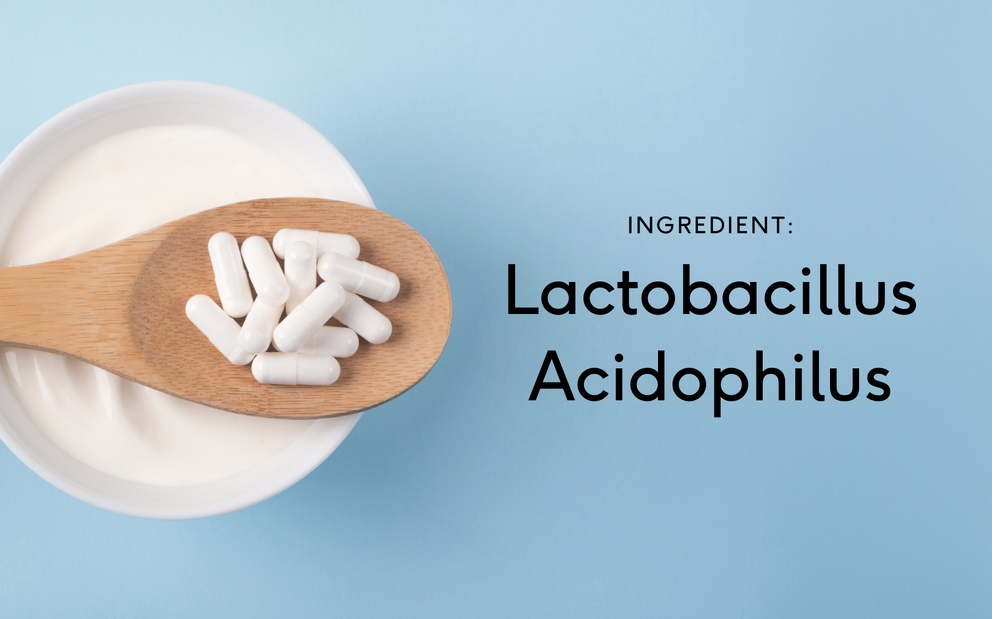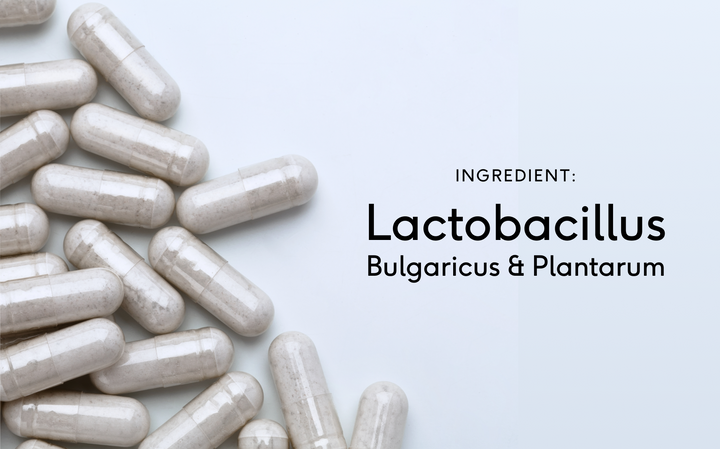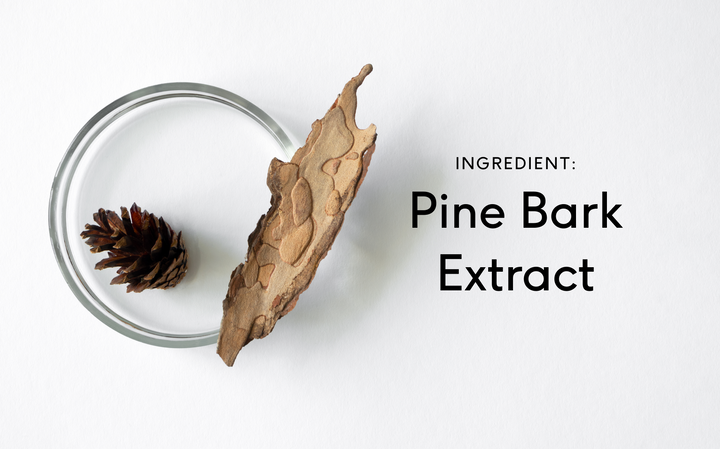Learn About Lactobacillus Acidophilus in 5 Minutes
Table of contents

What is Lactobacillus acidophilus?
Lactobacillus acidophilus, commonly known as acidophilus, is one of the most frequently used probiotics. This beneficial bacterium is naturally produced in your gut, but evidence indicates that taking acidophilus as a supplement could improve digestion and provide a broad range of other health benefits. L. acidophilus is one of over 200 members of the Lactobacillus genus.
Is Lactobacillus acidophilus water-soluble or fat-soluble?
Probiotic bacteria like L. acidophilus are neither water-soluble nor fat-soluble. Instead, these beneficial microorganisms absorb into your gut lining using a mechanism called cell suspension. The bioavailability of cell suspension is roughly equivalent to that of water-soluble substances, which means that acidophilus absorbs into your digestive system rapidly and efficiently.
Where can L. acidophilus be found naturally? Common sources of L. acidophilus:
Acidophilus is present in fermented dairy products such as yoghurt, cheese and milk kefir. This probiotic is also found in various fermented vegan foods like sauerkraut, pickles and tempeh.
What is the recommended daily value for Lactobacillus acidophilus?
L. acidophilus and other probiotics have not been recognised as essential nutrients, so there are no official nutrient reference values (NRV) for these beneficial bacteria. Most clinical studies conducted to determine the benefits of probiotics, however, have used daily dosages between 1 billion and 10 billion colony-forming units (CFU).
Can you absorb enough Lactobacillus acidophilus from food?
While ingesting enough acidophilus in the food you eat is relatively easy for people who consume dairy, vegans need to eat a lot of fermented foods if they want to absorb adequate levels of this probiotic from their diets. If you don’t like fermented foods or you just can’t stomach the idea of eating kimchi every day, taking L. acidophilus in supplement form may be more convenient.
Why is Lactobacillus acidophilus necessary for your body?
Your digestive tract contains trillions of beneficial bacteria that help you digest your food. L. acidophilus is one of the most abundant and most important probiotic bacteria, and a healthy digestive tract naturally produces adequate levels of this probiotic.
Processed foods and drinks, however, can harm your digestive tract whereas taking oral antibiotics completely wipes out your gut flora. It’s safe to assume that most people suffer from depleted levels of beneficial probiotic bacteria, and taking acidophilus in supplement form is a great alternative to the regular consumption of fermented foods.
Research indicates that L. acidophilus may help with common cold and flu symptoms, which is why we've included 2B CFU L. acidophilus in Feel Immunity.
Functions of Lactobacillus acidophilus
- Potential digestive benefits: A large body of research indicates that taking L. acidophilus may improve digestion in both healthy people and individuals with digestive disorders by bolstering overall gut health.
- Potential cardiovascular benefits: Studies show that acidophilus may reduce cholesterol, which would provide widespread cardiovascular benefits.
- Potential immune benefits: Research indicates that L. acidophilus may help with influenza and the common cold, and this probiotic may also reduce allergy symptoms.
- Potential skin benefits: Studies indicate that acidophilus may help with eczema and other immune-related skin conditions.
L. acidophilus is thought to have great benefits for skin health, which is why we've included 2B CFU of L. acidophilus in Feel Beauty Probiotic+.
- Potential female reproductive benefits: Some research indicates that taking L. acidophilus could help with infections.
When should you take Lactobacillus acidophilus?
Ideally, your body should be able to produce all the L. acidophilus you need for optimal digestion. Removing dairy from your diet, however, eliminates one of the most common natural sources of this probiotic, and various environmental and medical factors can reduce levels of beneficial bacteria in your gut even further. Taking acidophilus is a great idea if you’ve ingested oral antibiotics recently, but anyone can benefit from the potential gut-boosting effects of this popular probiotic strain.
How long do you need to take Lactobacillus acidophilus to start experiencing its benefits?
Acidophilus uses cell suspension to rapidly absorb through your digestive tract, but you may need to take this probiotic regularly over the course of a few weeks to start noticing its beneficial effects.
Consistency is key and our research recommends taking your Feel supplements for at least 3 months to allow your body to adjust and provide you with the desired benefits.
How long does it take for your body to digest/absorb L. acidophilus.
L. acidophilus absorbs into your gut lining almost immediately after ingestion.
How long does Lactobacillus acidophilus stay in your body after you take it?
Individual bacteria themselves don’t live very long, but the acidophilus you ingest in supplement form will create colonies that self-perpetuate within your gut.
Feel Pregnancy contains 2B CFU L. acidophilus probiotics to support digestion and skin health. The probiotics contained in Feel Pregnancy are naturally acid resistant, so will survive passing through the stomach acid before arriving at the gut, their target destination.
Is Lactobacillus acidophilus an antioxidant?
Research indicates that L. acidophilus may exert direct antioxidant activity in the digestive tract and throughout your body.
Can you overdose on Lactobacillus acidophilus? What are the effects?
Taking acidophilus in concentrations exceeding 20 billion CFU could cause mild digestive discomfort.
Does Lactobacillus acidophilus dissolve, flush out, or build up in the body?
Acidophilus colony-forming units that you ingest will be flushed out of your system relatively rapidly, but the bacteria colonies they leave behind can stay in your gut for years.
Can you take Lactobacillus acidophilus during a diet?
L. acidophilus supplements are vegan and gluten-free, and taking probiotics appears to streamline the digestive process, reducing waste and increasing calorie efficiency.
Are there synthetic forms of L. acidophilus?
In recent years, efforts have been undertaken to develop new strains of probiotics using CRISPR and other gene-editing tools. While the resulting probiotic bacteria are not strictly synthetic, they are certainly genetically modified.
Absorption rate of synthetic Lactobacillus acidophilus
Increasing bioavailability is one of the main aims of scientists who are developing genetically modified strains of probiotics.
Why might natural forms of Lactobacillus acidophilus be better?
Genetic engineering often produces unintended, harmful consequences.
How to take Lactobacillus acidophilus
You can ingest L. acidophilus in supplement form or by eating fermented foods.
Lactobacillus acidophilus trends in medicine
In 2020, a German study found that probiotics are useful in preventing sepsis in preterm infants when paired with human breast milk. Preterm infants fared better across the board when they received supplemental L. acidophilus. Also in 2020, a new clinical trial showed that taking acidophilus reduced abdominal pain in individuals who suffer from irritable bowel syndrome.
Sources
1. Efficacy of Probiotics in Prevention of Acute Diarrhoea: A Meta-Analysis of Masked, Randomised, Placebo-Controlled Trials
2. Probiotic Bacteria Lactobacillus Acidophilus NCFM and Bifidobacterium Lactis Bi-07 Versus Placebo for the Symptoms of Bloating in Patients With Functional Bowel Disorders: A Double-Blind Study
3. Effect of Probiotics on Blood Lipid Concentrations: A Meta-Analysis of Randomized Controlled Trials
4. Probiotic Effects on Cold and Influenza-Like Symptom Incidence and Duration in Children
5. Effect of Milk Fermented With Lactobacillus Acidophilus Strain L-92 on Symptoms of Japanese Cedar Pollen Allergy: A Randomized Placebo-Controlled Trial
6. Effect of Probiotic Mix (Bifidobacterium Bifidum, Bifidobacterium Lactis, Lactobacillus Acidophilus) in the Primary Prevention of Eczema: A Double-Blind, Randomized, Placebo-Controlled Trial
7. Orally Administered Multispecies Probiotic Formulations to Prevent Uro-Genital Infections: A Randomized Placebo-Controlled Pilot Study
8. Lactobacillus Acidophilus/Bifidobacterium Infantis Probiotics Are Beneficial to Extremely Low Gestational Age Infants Fed Human Milk
9. Lactobacillus acidophilus DDS-1 and Bifidobacterium lactis UABla-12 Improve Abdominal Pain Severity and Symptomology in Irritable Bowel Syndrome: Randomized Controlled Trial























































 Back
Back





